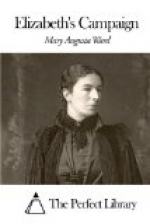Chicksands, startled from his own meditations, looked up to see two old ladies gazing with an eager interest at a couple of plane trees, which had just shed a profusion of bark and stood white and almost naked in the grey London air. They were dear old ladies from some distant country-side, with bonnets and fronts, and reticules, as though they had just walked out of Cranford, and after gazing with close attention at the plane trees near them they turned and looked at all the other plane trees in Whitehall, which presented an equally plucked and peeled appearance.
Then the one addressed as Susan laughed out—a happy, chuckling laugh.
’Oh, I see! My dear Ellen, how clever people are now! They’re camouflaged—that’s what it is—can’t you see?—all the way down, because of the raids!’
The admiring fervour of the voice was too much for Chicksands. He hurried past them, head down, and ran up the steps of the Ministry of Munitions. From that point of vantage he turned, shaken with amusement, to see the pair advancing slowly towards Westminster, their old-fashioned skirts floating round them, still pointing eagerly at the barkless trees. Had they come from some piny region where the plane is not? Anyway the tension of the day was less.
He repeated the tale to Aubrey Mannering a few minutes later, when they had turned together into Birdcage Walk. But Aubrey scarcely gave it the ghost of a smile. As to his old friend’s enquiries about his own work and plans, he answered them quite readily, but shortly, without any expansion; with the manner, indeed, of one for whom talk about himself had no sort of attraction. And as they passed along the front of the barracks, where a few men were drilling, Chicksands, struck by his companion’s silence, turned a sudden look upon him. Mannering’s eyes were absently and yet intently fixed on the small squads of drilling men. And it was sharply borne in on Chicksands that he was walking beside the mere image or phantom of a man, a man whose mind was far away—’voyaging through strange seas of thought alone.’ Mannering’s eyes were wide open; but they made the weird impression on the spectator of a double seeing—of some object of vision beyond and behind the actual scene of the barracks and the recruits, and that an object producing terror or pain. Chicksands made a remark and it was not answered.
It was not the first time that Arthur had observed this trance-like state in the man who was to be his brother-in-law, and had been his ‘chum’ from childhood. Others had noticed it, and he had reason to think that Beryl was often distressed by it. He had never himself seen any signs of strangeness or depression in Aubrey before the Easter of 1915, when they met in Paris, for the first time after the battle of Neuve Chapelle, in which Mannering had lost his dearest friend, one Freddy Vivian, of the Worcesters. During the winter they had met




